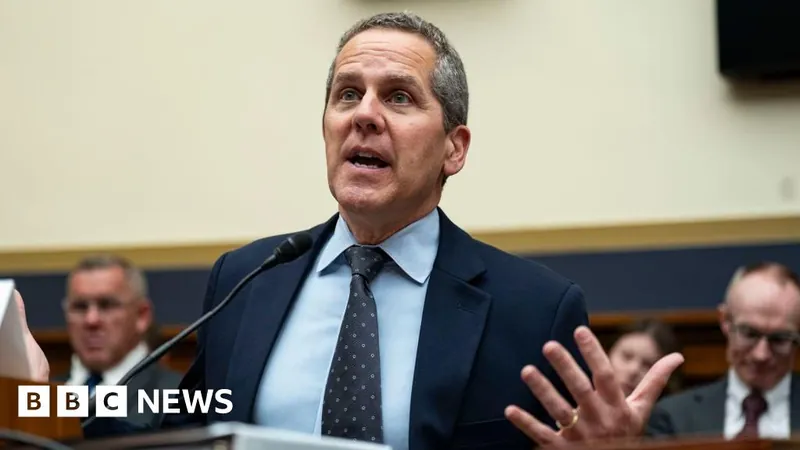
Turmoil at the Federal Reserve: Key Banking Regulator Steps Down Ahead of Trump's Arrival
2025-01-06
Author: Olivia
Introduction
In a dramatic shift within the U.S. financial landscape, Michael Barr, the top banking regulator at the Federal Reserve, has announced his early resignation, citing concerns over potential disputes as the nation braces for Donald Trump’s new administration. This unexpected decision comes amid ongoing discussions about the stability of the banking sector, especially in light of several bank failures that shook the financial system in 2023.
Background on Michael Barr
Barr, who had been advocating for stronger regulatory measures following these failures, is a figure who has faced significant scrutiny from Republican circles. His initial stance was to complete his term, which was set to last until 2026. However, emerging political tensions and the looming shadow of Trump's presidency led him to reassess his position. In a statement, Barr expressed, “The risk of a dispute over the vice president for supervision position could be a distraction from our mission,” indicating his desire to refocus on serving the American public.
Continuing Role at the Federal Reserve
Despite stepping down from his supervisory role, Barr will continue to serve on the Federal Reserve board, albeit in a diminished capacity. This transition paves the way for Trump to appoint a new supervisory leader from within the existing board members, a strategically important position created in response to the financial crisis of 2008.
Context of Recent Resignations
Barr’s decision follows a trend of high-profile resignations ahead of the political shift, including Gary Gensler, the head of the Securities and Exchange Commission, who also announced his departure, and FBI Director Chris Wray, who opted to leave two years before the end of his term. This wave of resignations underscores the uncertainty and reshuffling occurring in Washington as the new administration prepares to take the reins.
Impact on Federal Reserve Dynamics
The dynamics of the Federal Reserve, traditionally viewed as an independent entity, are now in question. While governors like Barr can only be removed by the president 'for cause,' the regulations governing supervisory roles remain ambiguous, leading to concerns about possible politicization of the Fed.
Republican Concerns and Future Appointments
Republicans have long targeted Barr, particularly for his push for stricter banking regulations, which they argue could hamper financial growth. With Trump’s administration likely to take a different stance on banking oversight, the appointment of Barr's successor could signal a significant shift in regulatory policy, especially as discussions about presidential authority over the Fed gain momentum.
Conclusion
As the American public anxiously awaits the incoming administration's moves, Barr’s exit is a stark reminder of the fragile balance between regulation and political influence in one of the world’s largest economies. Will the Trump era usher in a new era of relaxed banking regulations, or will the consequences of past failures compel stricter oversight? Only time will tell.



 Brasil (PT)
Brasil (PT)
 Canada (EN)
Canada (EN)
 Chile (ES)
Chile (ES)
 Česko (CS)
Česko (CS)
 대한민국 (KO)
대한민국 (KO)
 España (ES)
España (ES)
 France (FR)
France (FR)
 Hong Kong (EN)
Hong Kong (EN)
 Italia (IT)
Italia (IT)
 日本 (JA)
日本 (JA)
 Magyarország (HU)
Magyarország (HU)
 Norge (NO)
Norge (NO)
 Polska (PL)
Polska (PL)
 Schweiz (DE)
Schweiz (DE)
 Singapore (EN)
Singapore (EN)
 Sverige (SV)
Sverige (SV)
 Suomi (FI)
Suomi (FI)
 Türkiye (TR)
Türkiye (TR)
 الإمارات العربية المتحدة (AR)
الإمارات العربية المتحدة (AR)